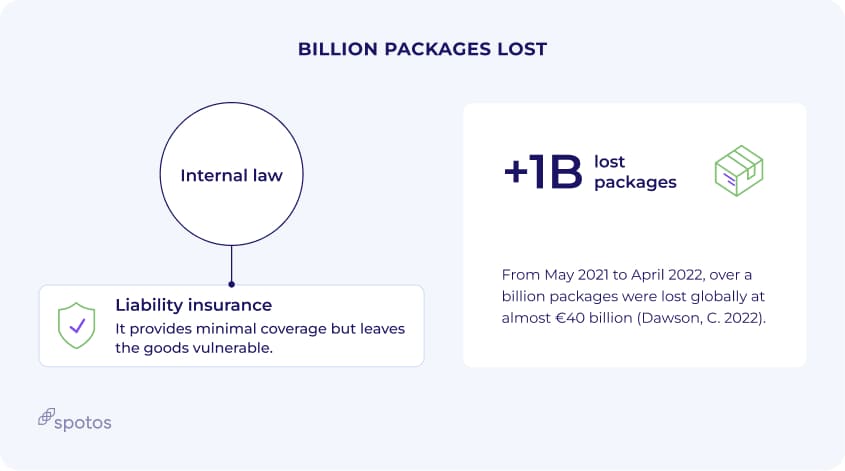Cargo forwarding involves coordinating the movement of goods from one location to another. As such, freight forwarders are responsible for the safe and secure transportation of goods. They are liable for any damages or losses during the shipment (FIATA, 2020). This is why freight forwarders must have insurance coverage to operate their business. There are several types of insurance that freight forwarders may need to have to operate their business. These may include:
- Liability insurance
- Cargo insurance
- Vehicles insurance
Besides, freight forwarders may also need other types of coverage, depending on the specific details of their business.
What is freight forwarding?
A cargo forwarding company organises goods shipments on behalf of its customer. It is like a freight broker but provides extensive services. They are responsible for ensuring safe, secure, and on-time goods distribution. Freight forwarders have an extended partnership network, which helps to get the job done.
What insurance is required for a freight forwarder?
A freight forwarder may need several insurance types to operate their business. The specific types of insurance depend on the details of their business and the risks associated with the shipments they handle (FIATA, 2020). Yet, some common types of insurance that a freight forwarder may need.
General liability insurance
Freight liability insurance covers damages or injuries that may occur while transporting goods. This type of insurance is known as “slip and fall” insurance. For example, liability insurance would cover replacing or repairing the goods if a shipment is damaged or lost during transit. Freight liability insurance can help freight forwarders to protect their business and customers. Besides, it can provide peace of mind by covering the costs associated with damages, injuries, and other liabilities. In other words, it prevents financial losses.

Cargo insurance
This type of insurance covers the value of the goods being shipped. For example, cargo insurance would cover replacing or repairing the goods up to the policy limit if a shipment is lost or damaged. This insurance can protect the shipper against the risks associated with transporting goods. This insurance can protect the consignee against the risks of receiving goods and legal expenses.
Errors and omissions insurance
Errors and omissions insurance is also known as professional liability insurance. This type of insurance protects businesses against claims of negligence, wrongdoing, or consequential losses. Freight forwarders may also need errors and omissions insurance to operate their business. This is because freight forwarders coordinate the movement of goods. They are liable for any errors or mistakes during the shipment.
Vehicle insurance
Vehicle insurance is a type of insurance that provides coverage for vehicles that are used for business purposes. This may include coverage for collisions, theft, and other vehicle operating risks.
Equipment insurance
If freight forwarders use equipment, such as cranes or forklifts, they will need insurance. This may include coverage for damage or loss of the equipment and injuries or damages due to its use.
Specialised insurance
Depending on the type of goods, they may need specialised insurance to cover the risks associated with those shipments. For example, hazardous materials may need insurance to cover the risks.
Are there any legal requirements for freight forwarders to have insurance?
Cargo forwarding is regulated in Europe and the UK (European Commission, 2022). Companies must follow legal and regulatory requirements. The important rule is to have adequate financial resources to cover the risks, i.e., it may include having enough insurance coverage. Besides this rule, freight forwarders must follow several other legal and regulatory requirements.
- Obtaining a license to operate a business
- Maintaining accurate and up-to-date records
- Providing customers with accurate information
How can a freight forwarder obtain insurance?
There are several ways that a freight forwarder can get insurance. These methods include.
Purchasing insurance from an insurance company
Insurance companies offer most types of insurance. Freight forwarders can compare different policies and choose the coverage that best meets their needs.
Get insurance through a Trade Association
Freight forwarders can also get insurance through a trade association or industry group. Many trade associations and industry groups offer insurance programs for their members. They provide discounted rates and specialised coverage for freight forwarders.
Buy insurance through a Freight Forwarder Association
Freight forwarder associations also offer insurance programs for their members. These programs provide specialised coverage for freight forwarders. Also, they give access to a network of insurance providers and other services.
Things to keep in mind when choosing insurance for a freight forwarding company
When choosing insurance for a cargo forwarding company, there are several things to remember. These include:
The types of insurance necessary for your business
Freight forwarders may need several types of insurance, such as
- Liability insurance
- Cargo insurance
- Vehicle insurance
- Errors and omissions insurance
It is important to understand your business operations and needs. Determine the types of insurance necessary to protect your business and customers.
The coverage limits and deductibles
Insurance policies limit the coverage they provide. Also, deductibles must be paid before the insurance coverage kicks in. It is important to review the coverage limits and deductibles in any insurance policy and ensure they are appropriate.
The reputation and financial stability of the insurance company
When choosing an insurer, it is important to consider reputation and financial stability. Insurance companies with a strong reputation and financial stability are more likely to be able to pay out claims in the event of an incident.
The terms and conditions of the insurance policy
Finally, it is important to review the terms and conditions of any insurance policy before purchasing it. This will help you to understand what is covered and what is excluded. Be aware of any limitations and restrictions on the policy.
Frequently Asked Questions
The cost of insurance for cargo forwarding varies depending on several factors:
- Type of insurance needed
- Coverage limits and deductibles
- Reputation and financial stability of the insurance company
- Terms and conditions of the insurance policy
It is difficult to provide an exact cost for insurance as many variables can affect the cost of a policy. Yet, as a general rule, the insurance cost for cargo forwarding is likely higher than that for other types of businesses.
Liability insurance is a type of insurance that provides coverage for damages or injuries. That may occur during a freight forwarder’s business operations. This type of insurance is known as “slip and fall” insurance. It covers injury, property damage, and personal and advertising injury.
There are several reasons why a freight forwarder should take liability insurance. These include:
- Protecting against the risks associated with the transportation of goods
- Protecting against claims of negligence or wrongdoing
- Providing peace of mind
Freight forwarders may need to have cargo insurance to operate their business. This is because freight forwarders coordinate the movement of goods. Cargo insurance can protect the freight forwarder against many types of liabilities.
The responsibility for ensuring cargo falls on the shipper or the consignee. The shipper is the person or company sending the goods, and the consignee is the person or company receiving the goods.
Usually, the shipper or the consignee buys cargo insurance to protect goods. This can include damage or loss during international freight and other liabilities, such as delays or errors in the routing or handling of the goods.
International freight forwarders may offer insurance as part of their services. Also, they are arranging insurance options for their customers. Yet, freight forwarders are not insurance companies and do not provide insurance themselves.
